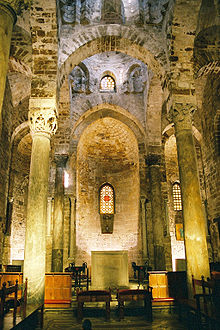- Maio of Bari
-
Maio of Bari (Italian: Majone di Bari, French: Maion de Bari) (died 10 November 1160), a Lombard merchant's son from Bari, was the third of the great admirals of Sicily. An ammiratus ammiratorum, or "Emir of Emirs," he was the most important man in the kingdom save the king himself. After the deposition and execution of Philip of Mahdia (1153), the admiralcy was vacant for a year until the succession of a new king, William I. William immediately removed the Englishman, Thomas Brun, and raised Maio to a higher post, for he was already chancellor (from 1150 or 1151).
Maio was not popular with the baronage and supported the immigration of Western Europeans, Roman Catholics all, to increase the influence of that church, which was his largest supporter (at first). The chiefest of baronial opponent to Maio was, at first, Robert de Bassonville, the count of Loritello and cousin to the king. He resented Maio's rise and his own cousin's royal powers. He joined with a Byzantine army under Michael Palaeologus in 1155 and took Bari. At that time, the king fell ill and remained so from September to Christmas. Maio and Hugh, Archbishop of Palermo, took control of the kingdom in the meanwhile. It was then, with revolt spreading in the peninsula, that insurrection began in the island. A conspiracy formed to overthrow both Maio and the king. Maio refused to panic and the major revolts were soon dead. However, a revolt led by one Bartholomew of Garsiliato took Butera, on Sicily, and proceeded to declare themselves in armed insurrection. The rebels demanded the king remove Maio and the archbishop from his inner circle. William refused. The rebels stirred up riots in the capital of Palermo itself, where the people demanded the release of Count Simon of Policastro, whom Maio had imprisoned without trial. William negotiated himself out of the bind and Maio remained his right-hand man, though Maio's own right-hand, Asclettin, the chancellor, was imprisoned by the king.
In 1156, it was Maio who was primarily responsible for the Treaty of Benevento which ended hostilities between Sicily and the Holy See and preserved for William the legatine powers granted originally to his father. The newfound alliance with Adrian IV made the Sicilians enemies, inevitably, of the Holy Roman Emperor Frederick Barbarossa. Maio may have even been present at the formation of the Lombard League, as an envoy of William's. Maio's concentration on events to the north, however, proved the downfall of the African possessions of the crown. On 11 January 1160, Mahdia surrendered and Maio received a lot of the blame. His unpopularity peaked, but so did his power.
His enemies spread rumours that he was aiming to seize the crown, that he had already seized the regalia with the help of Queen Margaret, with whom he was certainly in bed, and that he was even planning the king's assassination: with the help of the pope. Certainly all such allegations were patent nonsense, but a conspiracy arose on the peninsula around one Matthew Bonnellus, who planned to assassinate the admiral himself. Bonnellus was an intimate of Maio, who wished to marry his daughter to him, and therefore well-positioned to strike the undoing blow. While Maio prepared a wedding, Bonnellus prepared an assassination. On 10 November 1160, in the street called Via Coperta, Bonnellus and his conspirators stabbed Maio to death and severely wounded his chief protégé, Matthew of Ajello. Maio's wife and children were quickly whisked away as a mob descended on his palace. It was a brutal end.
Maio was a man of arts and letters, a patron and Renaissance man before his time. He wrote an "Exposition of the Lord's Prayer" in the scholastic tradition. He also endowed one of Palermo's most beautiful churches: San Cataldo, one of the last Arabesque Latin churches in the Norman Mezzogiorno. Maio's influence as a courtier of King William was great. His administration is noted primarily for consolidating the centralisation begun under the first two Rogers. Though he neglected the widespread conquests (wrought largely by George of Antioch) of the kingdom, he assured a stability that proved after his death to be very volatile. The King's confidence in him was so great as to result in the nomination of his brother Stephen and his brother-in-law Simon to high posts of captain in Apulia and seneschal. Lord Norwich calls him "one of the most influential statesmen in Europe." His enemies, however, hated him for it. As the hateful chronicler Hugo Falcandus put it:
“ This Maio was a very monster; indeed, it would be impossible to find vermin more loathsome, more pernicious or more damaging to the Kingdom. His character was capable of any baseness, and his eloquence was equal to his character. Great was his facility for pretence or dissimulation at will. He was, in addition, much given to debauchery, for ever seeking to bring noble matrons and virgins to his bed; the more unstained their virtue, the more ardently did he strive to possess them. ” Sources
- Norwich, John Julius. The Kingdom in the Sun 1130-1194. Longman: London, 1970.
Categories:- 1160 deaths
- People from Bari (city)
- Lombards
- Admirals
- Assassinated military personnel
Wikimedia Foundation. 2010.

